Home warranty company Frontdoor (NASDAQ:FTDR) reported results in line with analysts' expectations in Q1 CY2024, with revenue up 3% year on year to $378 million. The company expects next quarter's revenue to be around $535 million, in line with analysts' estimates. It made a non-GAAP profit of $0.43 per share, improving from its profit of $0.28 per share in the same quarter last year.
Frontdoor (FTDR) Q1 CY2024 Highlights:
- Revenue: $378 million vs analyst estimates of $376.7 million (small beat)
- Adjusted EBITDA: $71 million vs analyst estimates of $47 million (big beat)
- EPS (non-GAAP): $0.43 vs analyst estimates of $0.20 ($0.23 beat)
- Revenue Guidance for Q2 CY2024 is $535 million at the midpoint, roughly in line with what analysts were expecting
- The company reconfirmed its revenue guidance for the full year of $1.83 billion at the midpoint (in line)
- The company raised its adjusted EBITDA guidance for the full year of $365 million at the midpoint (above expectations)
- Gross Margin (GAAP): 51.3%, up from 46.3% in the same quarter last year
- Free Cash Flow of $73 million, up 35.2% from the previous quarter
- Market Capitalization: $2.40 billion
Established in 2018 as a spin-off from ServiceMaster Global Holdings, Frontdoor (NASDAQ:FTDR) is a provider of home warranty and service plans.
Frontdoor’s primary business revolves around providing homeowners with subscription-based service agreements that cover the repair or replacement of major home systems and appliances. The company operates through a network of pre-screened, licensed service contractors to address common household breakdowns, ranging from electrical systems and plumbing to HVAC and kitchen appliances. This service model helps homeowners avoid the unexpected costs and inconveniences of home system and appliance failures.
The company's flagship brands, including American Home Shield, HSA, Landmark, and OneGuard, have a long-standing reputation in the home warranty market. Each brand caters to specific regional needs and customer preferences, enabling Frontdoor to serve a diverse customer base across the United States.
A key aspect of Frontdoor's business model is its focus on customer service and satisfaction, which is reflected in its comprehensive service plans and transparent pricing policies.
Specialized Consumer Services
Some consumer discretionary companies don’t fall neatly into a category because their products or services are unique. Although their offerings may be niche, these companies have often found more efficient or technology-enabled ways of doing or selling something that has existed for a while. Technology can be a double-edged sword, though, as it may lower the barriers to entry for new competitors and allow them to do serve customers better.
Frontdoor's primary competitors include HomeServe (owned by Brookfield Infrastructure NYSE:BIP), The ServiceMaster (NYSE:SERV), Assurant (NYSE:AIZ), and private companies American Residential Warranty, Choice Home Warranty, and Cinch Home Services.Sales Growth
A company’s long-term performance can give signals about its business quality. Even a bad business can shine for one or two quarters, but a top-tier one may grow for years. Frontdoor's annualized revenue growth rate of 6.9% over the last five years was weak for a consumer discretionary business. 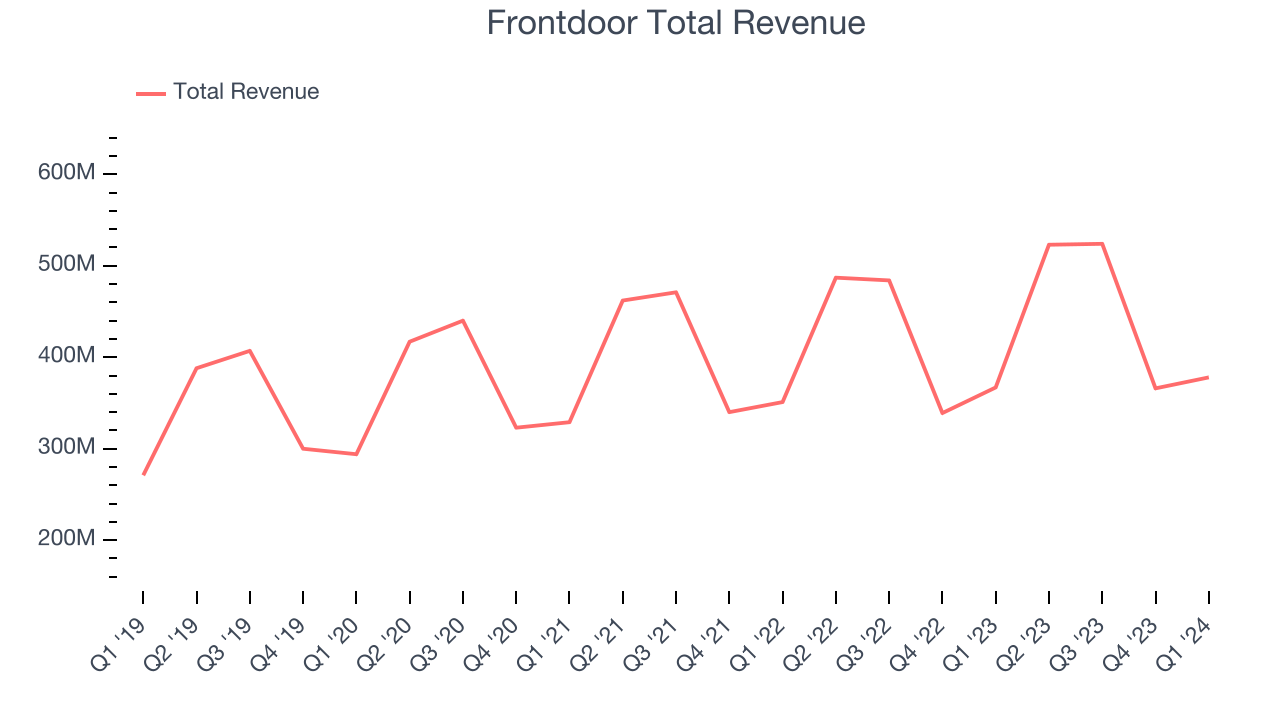 Within consumer discretionary, a long-term historical view may miss a company riding a successful new product or emerging trend. That's why we also follow short-term performance. Frontdoor's recent history shows the business has slowed as its annualized revenue growth of 5% over the last two years is below its five-year trend.
Within consumer discretionary, a long-term historical view may miss a company riding a successful new product or emerging trend. That's why we also follow short-term performance. Frontdoor's recent history shows the business has slowed as its annualized revenue growth of 5% over the last two years is below its five-year trend.
This quarter, Frontdoor grew its revenue by 3% year on year, and its $378 million of revenue was in line with Wall Street's estimates. The company is guiding for revenue to rise 2.3% year on year to $535 million next quarter, slowing from the 7.4% year-on-year increase it recorded in the same quarter last year. Looking ahead, Wall Street expects sales to grow 3.9% over the next 12 months, an acceleration from this quarter.
Operating Margin
Operating margin is a key measure of profitability. Think of it as net income–the bottom line–excluding the impact of taxes and interest on debt, which are less connected to business fundamentals.
Frontdoor has done a decent job managing its expenses over the last eight quarters. The company has produced an average operating margin of 12.2%, higher than the broader consumer discretionary sector.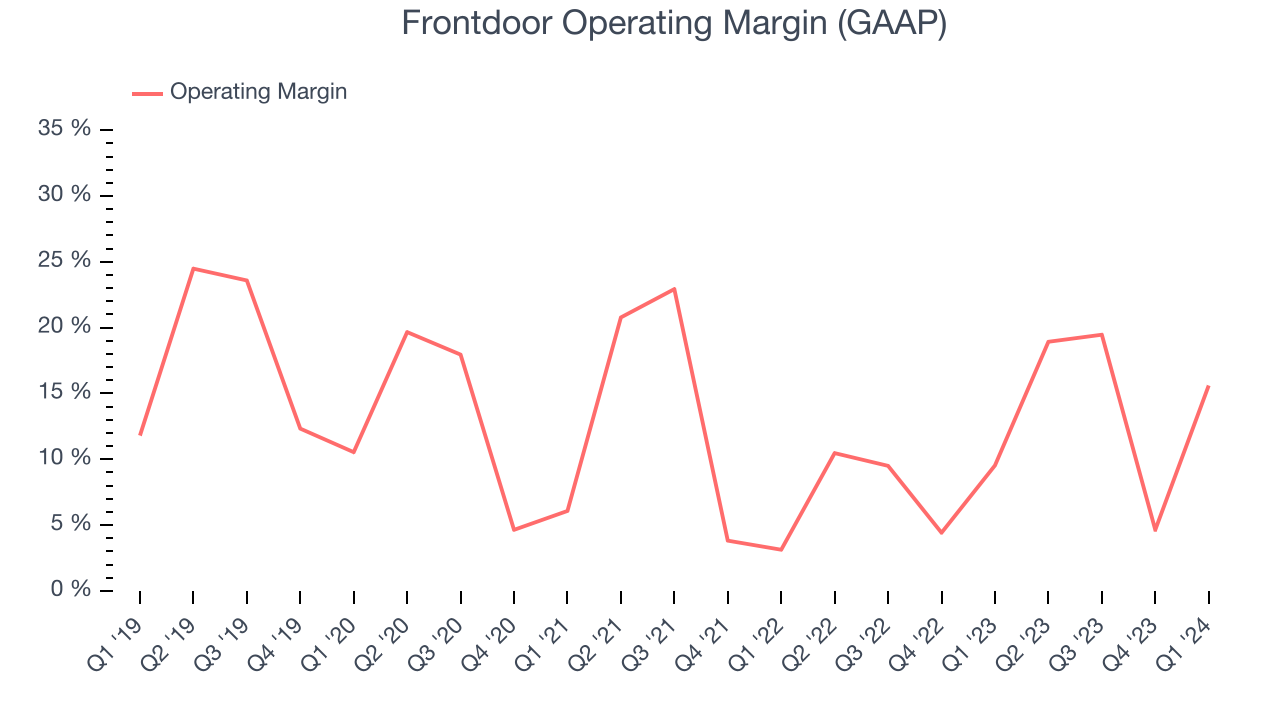
In Q1, Frontdoor generated an operating profit margin of 15.6%, up 6.1 percentage points year on year.
Over the next 12 months, Wall Street expects Frontdoor to maintain its LTM operating margin of 15.5%.EPS
Analyzing long-term revenue trends tells us about a company's historical growth, but the long-term change in its earnings per share (EPS) points to the profitability and efficiency of that growth–for example, a company could inflate its sales through excessive spending on advertising and promotions. 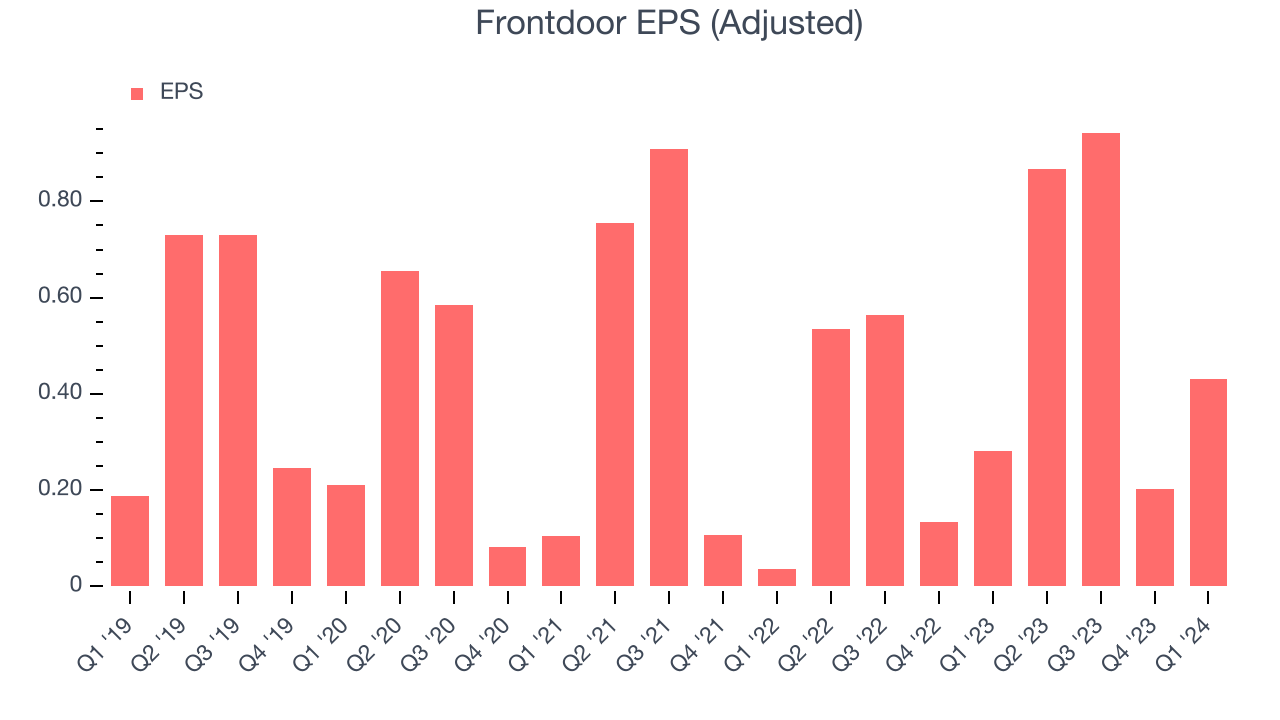
Over the last five years, Frontdoor's EPS grew 42.4%, translating into an unimpressive 7.3% compounded annual growth rate. This performance is in line with its 6.9% annualized revenue growth over the same period.
In Q1, Frontdoor reported EPS at $0.43, up from $0.28 in the same quarter last year. This print easily cleared analysts' estimates, and shareholders should be content with the results. Over the next 12 months, Wall Street expects Frontdoor to perform poorly. Analysts are projecting its LTM EPS of $2.44 to shrink by 2% to $2.39.
Cash Is King
If you've followed StockStory for a while, you know we emphasize free cash flow. Why, you ask? We believe that in the end, cash is king, and you can't use accounting profits to pay the bills.
Over the last two years, Frontdoor has shown mediocre cash profitability, putting it in a pinch as it gives the company limited opportunities to reinvest, pay down debt, or return capital to shareholders. Its free cash flow margin has averaged 8.9%, subpar for a consumer discretionary business.
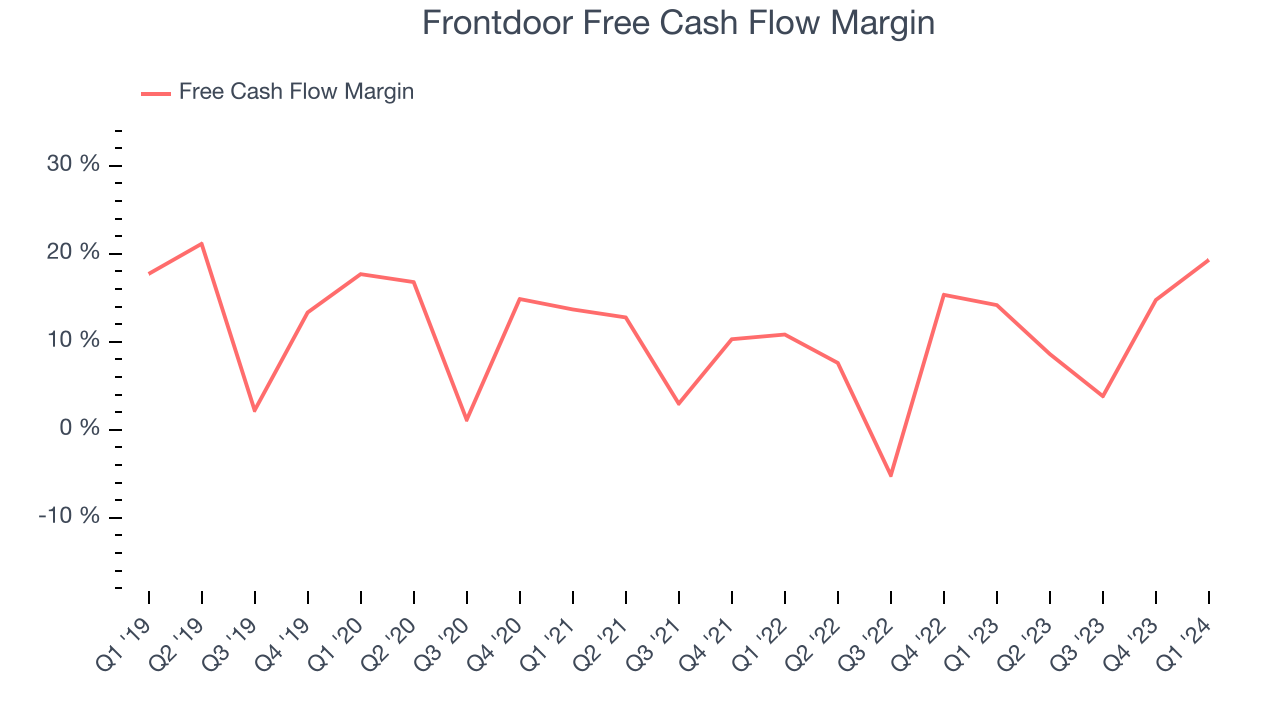
Frontdoor's free cash flow came in at $73 million in Q1, equivalent to a 19.3% margin and up 40.4% year on year.
Return on Invested Capital (ROIC)
EPS and free cash flow tell us whether a company was profitable while growing revenue. But was it capital-efficient? Enter ROIC, a metric showing how much operating profit a company generates relative to how much money the business raised (debt and equity).
Although Frontdoor hasn't been the highest-quality company lately because of its poor top-line performance, it historically did a wonderful job investing in profitable business initiatives. Its five-year average return on invested capital was 49%, splendid for a consumer discretionary business.
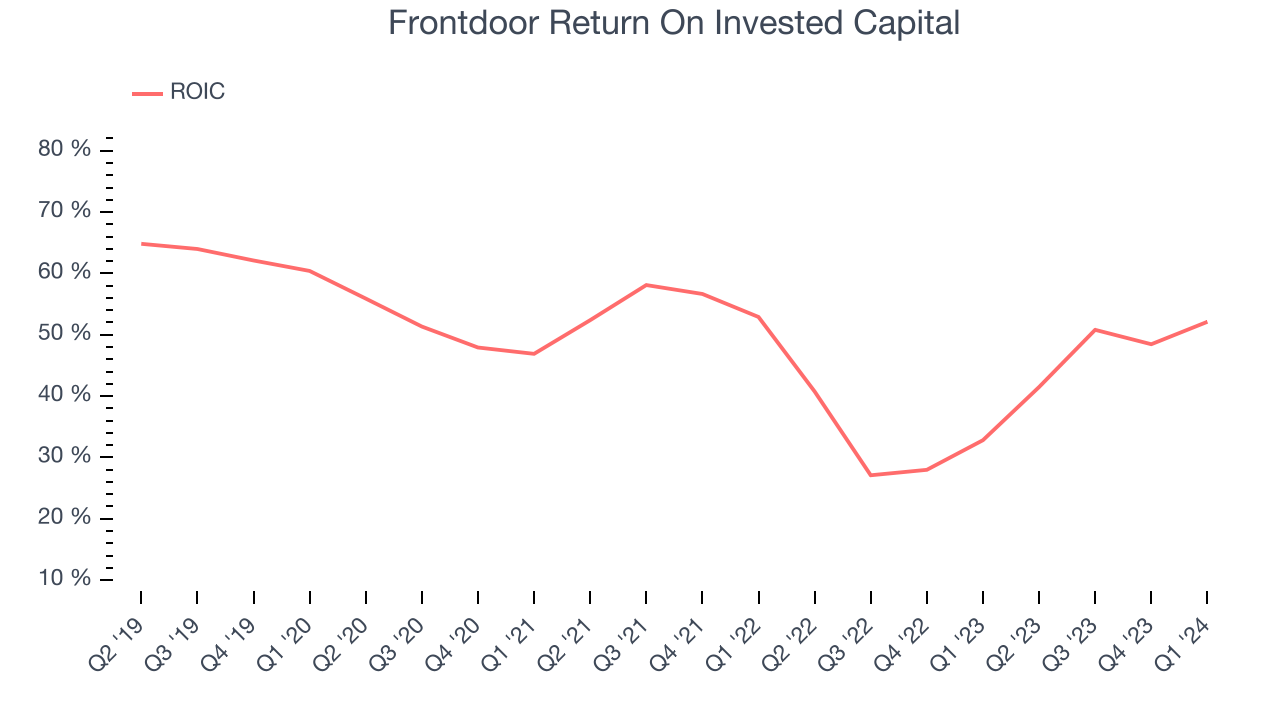
The trend in its ROIC, however, is often what surprises the market and drives the stock price. Unfortunately, Frontdoor's ROIC averaged 11.2 percentage point decreases over the last few years. We like what management has done historically but are concerned its ROIC is declining, perhaps a symptom of waning business opportunities to invest profitably.
Balance Sheet Risk
Debt is a tool that can boost company returns but presents risks if used irresponsibly.
Frontdoor reported $378 million of cash and $610 million of debt on its balance sheet in the most recent quarter. As investors in high-quality companies, we primarily focus on two things: 1) that a company's debt level isn't too high and 2) that its interest payments are not excessively burdening the business.
With $365 million of EBITDA over the last 12 months, we view Frontdoor's 0.6x net-debt-to-EBITDA ratio as safe. We also see its $13 million of annual interest expenses as appropriate. The company's profits give it plenty of breathing room, allowing it to continue investing in new initiatives.
Key Takeaways from Frontdoor's Q1 Results
We were impressed by how significantly Frontdoor blew past analysts' adjusted EBITDA and EPS expectations this quarter. While its full-year revenue guidance was maintained, the company raised its full year adjusted EBITDA guidance, showing that growth is as expected but it's coming in more profitably. Overall, this quarter's results seemed fairly positive and shareholders should feel optimistic. The stock is up 4.8% after reporting and currently trades at $32.25 per share.
Is Now The Time?
Frontdoor may have had a favorable quarter, but investors should also consider its valuation and business qualities when assessing the investment opportunity.
We cheer for all companies serving consumers, but in the case of Frontdoor, we'll be cheering from the sidelines. Its revenue growth has been uninspiring over the last five years, and analysts expect growth to deteriorate from here. And while its stellar ROIC suggests it has been a well-run company historically, the downside is its number of home service plans has been disappointing. On top of that, its projected EPS for the next year is lacking.
Frontdoor's price-to-earnings ratio based on the next 12 months is 12.9x. While there are some things to like about Frontdoor and its valuation is reasonable, we think there are better opportunities elsewhere in the market right now.
Wall Street analysts covering the company had a one-year price target of $39.50 per share right before these results (compared to the current share price of $32.25).
To get the best start with StockStory, check out our most recent stock picks, and then sign up for our earnings alerts by adding companies to your watchlist here. We typically have the quarterly earnings results analyzed within seconds of the data being released, and especially for companies reporting pre-market, this often gives investors the chance to react to the results before the market has fully absorbed the information.
